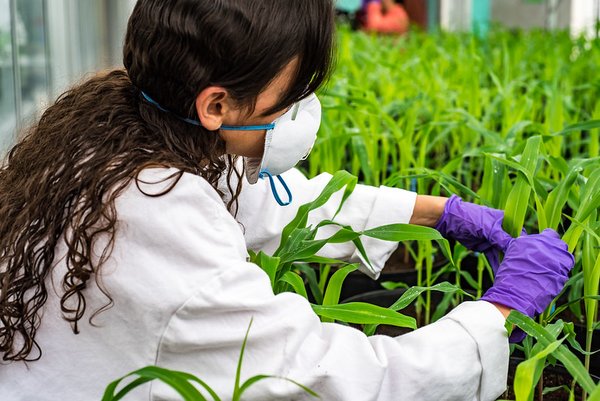- Share this article
- Subscribe to our newsletter
“One CGIAR” boost to agricultural research
CGIAR, a global research partnership comprising 15 centres which work with hundreds of partners in 80 countries across the world, seeks to unify its agricultural research activities under the umbrella of a “One CGIAR” approach, a concept it discussed earlier in June. The organisation argues that, especially against the background of the COVID-19 pandemic, a combined effort by scientists working in various fields is essential to feed a burgeoning world population.
Representatives of CGIAR, Germany’s Federal Ministry for Economic Cooperation and Development (BMZ) and the private sector looked at the new approach and assessed prospects for collaboration and agricultural research in general in a virtual meeting moderated by Deutsche Gesellschaft für Internationale Zusammenarbeit (giz) in June 2020.
CGIAR was an outcome of the Green Revolution and was conceived from the outset as a concept to discuss major agriculture and food topics within a network. Outlining the new “One CGIAR” approach, Marco Ferroni, Chairman of the organisation’s System Management Board, explained that in a longer process with its various autonomous institutes, CGIAR would now be adopting an integrated strategy and integrated management.
Agricultural research pays its way
Stressing the significance of agricultural research, Ferroni highlighted aspects such as environmental costs, improving technologies and maintaining sustainability and biodiversity. “With good institutions and governance ensuring a dissemination of results in the field, impacts can be achieved that also promote better agricultural policies,” Ferroni maintained. “The favourable cost/benefit ratio of agricultural research shows that it definitely pays its way.”
CGIAR has launched a wide range of activities addressing the COVID-19 pandemic and has compiled a report on the issue. “The COVID-19 crisis has shown the world what disruption is, and where weaknesses exist, also in the food system,” Ferroni said in the meeting. “People are facing income losses, and value chains have been interrupted.”
CGIAR is now collaborating with various development banks and conducting
comparative analyses of projects to address the crisis. It has launched a food systems response to COVID-19 which recognises the need for rapid and science-based efforts for response, recovery and resilience. Action is being taken to provide data which can guide donor investments, support health systems with testing facilities and promote a One Health approach to prevent or contain future zoonosis outbreaks.
“In the past, problems were often still addressed and processed in silos, and indeed, much was achieved across the board,” Ferroni noted. “”But today, we have to think in terms of systems, and that is the essence of the CGIAR reform.” Regarding collaboration with Germany’s BMZ, he stressed the latter’s emphasis on sustainability and a Green Agenda.
Boosting progress – the Green Innovation Centres
Sebastain Lesch, Head of Unit, International agricultural policy, Agriculture, Innovation at the BMZ, explained the significance of the Green Innovation Centres that his ministry had founded to spread agricultural innovations. There are 14 of these centres in Africa and one in India, and they form the core of the BMZ “One World – No Hunger” special initiative, operating with a total of 119 partners in all. The BMZ is already involved in a wide range of collaborative schemes with CGIAR in Africa. Areas include soil conservation and rehabilitation, seed and digitisation, mechanisation, digitisation and taking innovations to scale via start-ups, precision agriculture and value chain management.
The role of the private sector
Claudia Makadristo, Regional Manager Africa for Seedstars World, a Swiss-based group of companies engaging in emerging markets, works as a scout for enterprises and innovators in the African technology sector. “African agriculture cannot survive solely on traditional technologies,” Makadristo said. “Agritech businesses play a crucial role.” Agricultural technology could help farmers with scans showing when diseases were ahead or give them a better chance to identify the right planting time, for instance. Green technologies held a huge potential in Africa, she maintained, while digital technologies offered vast market opportunities.
Ferroni agreed on the significance of the emerging private sector in the agritech area, and mentioned that CGIAR was also establishing technology transfer offices and discussing the role of public-private partnerships. “Technology is essential, but the setting is important,” Ferroni added. “We have to go out and identify primary needs. Technology has to be needs-driven. Big corporations can invest in profitable areas. But farmers can’t always afford investments. This where public agricultural research and subsequent dissemination plays a crucial role.”
Mike Gardner, journalist, Bonn/Germany





Add a comment
Be the First to Comment